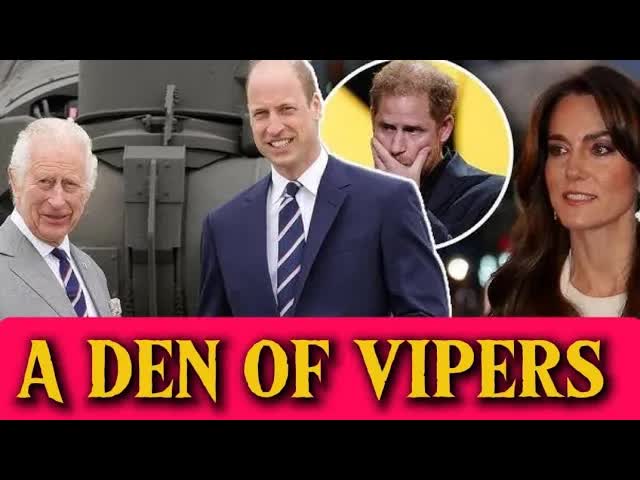The British Royal Family has long been a subject of intrigue, but recent revelations have painted a stark picture of an institution riddled with dysfunction and scandal.
What once seemed like a fairytale is now viewed by many as a den of vipers, where power struggles and secretive dealings overshadow the notion of familial love.
The ongoing tensions between Prince Harry and his brother, Prince William, highlight a rift that only seems to deepen with time.
Instead of welcoming Harry’s happiness with Meghan Markle, the royal establishment launched a relentless campaign filled with racism and hostility.
This toxic environment took a toll on their mental health, pushing Harry to seek refuge away from the glaring eyes of the monarchy.
It’s not surprising that he chose to step back from royal duties, unwilling to be a scapegoat for his brother’s insecurities.
The Royal Family’s actions have revealed a façade that crumbles under scrutiny.
Beneath their polished public image lies a dysfunctional entity driven by greed and a lack of empathy.
The reality behind palace walls starkly contrasts the image they project, exposing a self-serving cartel rather than a nurturing family.
Emotional neglect and a lack of genuine affection have left scars on younger royals.
Harry’s courageous decision to distance himself from this toxic atmosphere speaks volumes about his character.
He has chosen to prioritize his mental well-being and happiness over the expectations of royal life, a choice that shines a light on the cracks within the monarchy.
His departure has not only been a personal journey but also a revelation of the harsh realities faced by those within the royal fold.
Harry has forged a new path, one that allows him to break free from the constraints of royal expectations and embrace his true self.
The world now sees the royal family for what it truly is, a far cry from the supportive unit they claim to be.
Harry’s relationship with Meghan represents a triumph over the stifling traditions of the House of Windsor.
Their bond, built on mutual respect and understanding, stands in stark contrast to the calculated interactions often seen among royal members.
This union is celebrated by many as a beacon of hope, symbolizing a break from the oppressive norms of the past.
However, the consequences of royal corruption continue to emerge.
The British monarchy has historically functioned like a self-serving organization, prioritizing status and privilege over the well-being of its members.
Harry’s experiences reveal deep-rooted issues within the institution, where personal happiness is frequently sacrificed for the sake of maintaining a polished public image.
Rather than accepting Meghan into the fold, the royals responded with a torrent of negativity aimed at preserving their tarnished reputation.
The media frenzy surrounding them only serves to expose the fragility of the royal façade.
Yet, Harry’s courage to speak out has ignited global conversations about the monarchy’s true nature and its impact on individuals within its reach.
As public awareness grows, so does the demand for transparency and accountability within the monarchy.
Many are hopeful that this saga will spark the reforms necessary to transform the British royal family into a symbol of unity and service, rather than a shadowy cabal shielded from scrutiny.
The ongoing scandals challenge the perception of the royal family as a legitimate family unit, instead likening it to a tightly controlled organization.
With Harry no longer by his side, Prince William must now navigate royal life independently.
The absence of his brother transforms the dynamics of the monarchy, leaving William to confront the complexities of royal responsibilities without the support he once relied upon.
The future of the monarchy hangs in the balance, resting on the ability of its remaining members to adapt to changing expectations and societal demands.
As the world watches closely, there is a collective hope that these pressures will lead to meaningful changes within the institution.
The royal family’s survival may ultimately depend on their willingness to evolve and embrace a more transparent and accountable approach.
The narrative surrounding the British monarchy is shifting, and the call for reform has never been more urgent.
